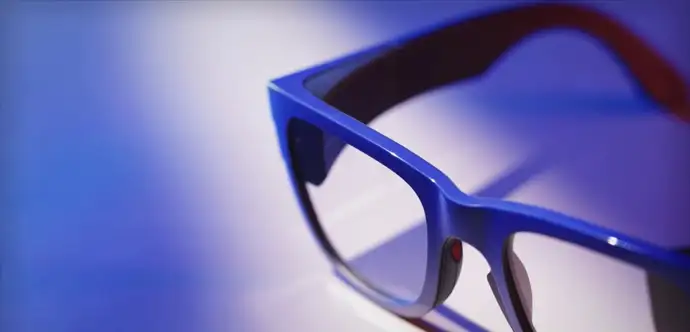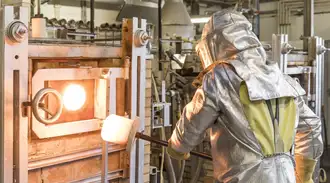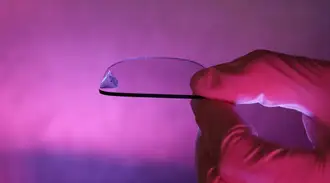
A new era of augmented reality
Background
Today, even as the technical capabilities of augmented reality glasses continue to improve, another challenge inhibits them from reaching their potential: scale. Whereas global supply chains and manufacturing processes for devices like cell phones and laptops have long been established and fine-tuned, that is hardly the case for augmented reality glasses. Without the ability to scale, even the most advanced augmented reality glasses could only get so far. It was within that nexus, bridging that gap between high-performance optical design and world-class advanced optical manufacturing, that Lumus and SCHOTT began their partnership.

Built on a shared foundation of advanced optics
Since its inception in 1884, SCHOTT has been a pioneer in advancing the concepts, materials, capabilities, and manufacturing processes of the optics industry. It was this rich history in advanced optics, as well as a long-established global hub for mass manufacturing optical components in Malaysia for around 50 years, that made the company uniquely positioned to evolve its high-index optical glass products and iron out the specific manufacturing requirements of AR devices. A decade ago, SCHOTT created the Strategic Business Field Augmented Reality, and has been working on high-index glass wafers, marketed as SCHOTT RealView®, ever since.
Task
In 2019, SCHOTT entered a strategic partnership with Lumus. The world class optics firm is dedicated to developing exceptionally efficient reflective AR waveguides that merge digital and physical worlds like never before. Lumus’s reflective waveguide optical element technology enables the most natural-looking, sleek, and compact optical designs. Reputable industry analysts like Karl Guttag laud the technology, stating that “Lumus, with their Z-Lens 2-D reflective waveguides, seems to have a big advantage in image quality and efficiency over the many diffractive waveguides.”
Working hand in hand with SCHOTT’s advanced optical manufacturing pedigree, the two highly-committed industry leaders with complementary strengths set out with one goal in mind: augmented reality glasses that are not only best-in-class from a performance and wearability standpoint, but manufacturable at industry scale – and therefore cost-effective to end users – as well.
SCHOTT and Lumus: innovation fueled by collaboration
Solution: A manufacturing evolution before the AR revolution
When the two companies first set off, only prototyping based on lab processes was possible. In the time since the partnership began, SCHOTT manages the control of the entire process -- from melting raw blocks of optical glass to processing the raw glass into final waveguides -- developing specific solutions and continuously improving and stabilizing the overall flow of manufacturing.
SCHOTT’s vertically integrated production chain leverages over a century of expertise across coating applications, precision polishing, bonding, contouring, and final assembly. Today, all phases of product development in consumer electronics are supported.
Making AR accessible for consumers
The market always pushes for more cost-effective, higher-performing materials – but the price for AR consumer devices remains high, just like the early days of cell phones that cost thousands of dollars. While technical challenges remain, steady progress in advanced optics and core components paves the way for more affordable and sleek AR devices. Through a shared culture of innovation, SCHOTT and Lumus have fostered a diverse field of scientists and engineers whose collective effort remains focused on building a scalable manufacturing process that will drive the cost of smart glasses down.
That means consumers can purchase smart glasses at consumer price points. In 2024, the companies extended the partnership to include new optical architectures for even better performance and flexibility in design of the AR glasses – and if the history of technology teaches anything, a breakthrough application or disruptive design could further ignite the market.
SCHOTT and Lumus are paving the way to make such a future achievable.



